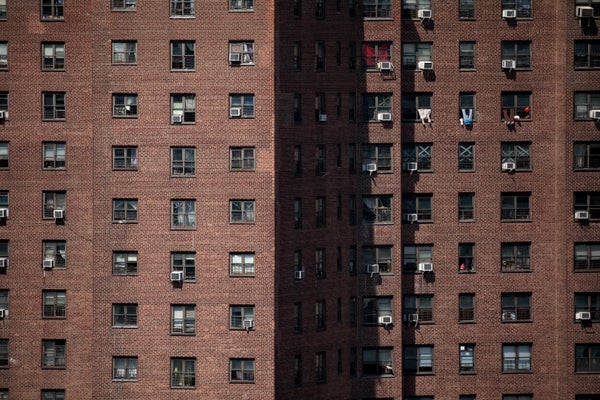CLIMATEWIRE | Ann Chanecka realized why the public housing apartment was so warm as soon as she entered the unit in Tucson, Arizona — the air conditioner was turned off.
“Families are reluctant to turn on their air conditioner,” said Chanecka, Tucson’s deputy director of housing and community development.
The reason: Public-housing residents have to pay their own cooling costs, unlike other utility bills that are included in their monthly rent.
On supporting science journalism
If you're enjoying this article, consider supporting our award-winning journalism by subscribing. By purchasing a subscription you are helping to ensure the future of impactful stories about the discoveries and ideas shaping our world today.
The Biden administration took a significant step toward protecting the nation’s 1.6 million public housing residents from heat by agreeing to pay air conditioning costs for those who ask. Forecasters say this summer could be the hottest on record.
The move by the Department of Housing and Urban Development comes as advocates urge HUD to go one step further and formally agree to pay all residents’ air conditioning costs regardless of whether they request help.
HUD has long required most residents to pay air conditioning bills under a policy established decades ago when cooling was considered a luxury and before global warming pushed temperatures to record highs.
The new decision could help hundreds of thousands of residents. Roughly 80 percent of public-housing units have air conditioning.
“People do not turn their air conditioner on because they’re afraid they cannot pay their bill. This is going to change that,” said Richard Monocchio, principal deputy assistant secretary for HUD’s Office of Public and Indian Housing.
“It’s going to be a huge health enhancement for residents throughout the country because we know extreme heat hits everywhere right now,” Monocchio added.
Public-housing advocate Daniel Carpenter-Gold welcomed HUD’s action but said the department “must do more to meet the universal need for cooling.”
Carpenter-Gold is a lawyer with the Public Health Law Center, which leads a coalition that formally petitioned HUD in October 2022 to improve the health of public-housing residents through measures such as paying for air conditioning. The petition remains under review.
HUD announced its decision in a recent 13-page memo to local housing authorities. The “guidance” memo, which contains no mandates, simply authorizes housing authorities to pay the air conditioning bills of any resident who requests it.
“This is an optional program,” Carpenter-Gold said. Its effectiveness “depends on how many public housing authorities take it up.”
Housing authorities are more likely to adopt new programs “if they get explicit requirements from HUD, which is one of the reasons why we’ve pushed for HUD to make this a regulatory requirement,” Carpenter-Gold said.
Housing authorities have long been allowed to pay extra utility costs for residents who ask. Most requests involve special circumstances such as high electricity costs because of medical equipment. Although residents have been able to request air conditioning payments, “people have not known it was a possibility to ask,” said Chanecka of Tucson.
Chanecka called HUD’s guidance “an additional tool” to protect the city’s 3,200 public-housing residents from the punishing heat of southern Arizona. “We need several tools.”
Reprinted from E&E News with permission from POLITICO, LLC. Copyright 2024. E&E News provides essential news for energy and environment professionals.
